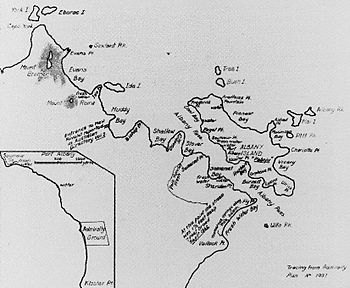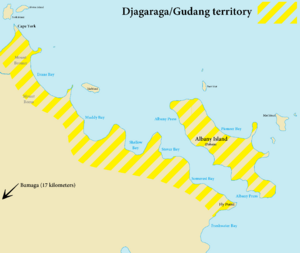Djagaraga facts for kids
The Djagaraga or Gudang people are an Aboriginal Australian group. They traditionally lived along the coast from Cape York to Fly Point in Queensland. This area also included Albany Island, which they called Pabaju.
When European settlers arrived, the Djagaraga were sometimes known as the Somerset tribe. This name came from the settlement of Somerset, which was built on their lands in 1863.
Some of the names used for different groups within the Djagaraga, like Yatay, Gudang, and Kartalaiga, came from the Western and Central Torres Strait Islanders. For example, "Kartalaiga" meant "green frog person," and the green frog was an important symbol for that group.
Contents
Language of the Djagaraga
The Djagaraga people spoke the Gudang language, also known as Djagaraga. This language was part of a larger group of languages called the northern Paman subgroup.
How Djagaraga People Lived Together
The Djagaraga people were organized into smaller groups, sometimes called "hordes." These groups lived and worked together in different parts of their traditional lands.
Historians have recorded some of these groups, including:
- Gudang/Alauian (from the Cape York area)
- Unduamo
- Kekosino (from the Escape River area)
- Kokiliga
Djagaraga Culture and Connections
The Djagaraga people had very close relationships with their neighbors, especially the Kaurareg people from the Torres Strait Islands. They were so connected that they were almost seen as an extension of the Kaurareg culture.
They also shared trade, family ties, and special ceremonies with the Unduyamo people, who lived along the eastern coast. Some experts believe that the Djagaraga and Unduyamo might have led important ceremonies for the Torres Strait Islanders. These ceremonies could have included initiation rites and rituals to help natural species grow.
A Brief History
Sadly, historical accounts mention that many Djagaraga people were killed by the Yadhaykenu people during a time that was still remembered by living members of the community.
 | May Edward Chinn |
 | Rebecca Cole |
 | Alexa Canady |
 | Dorothy Lavinia Brown |



